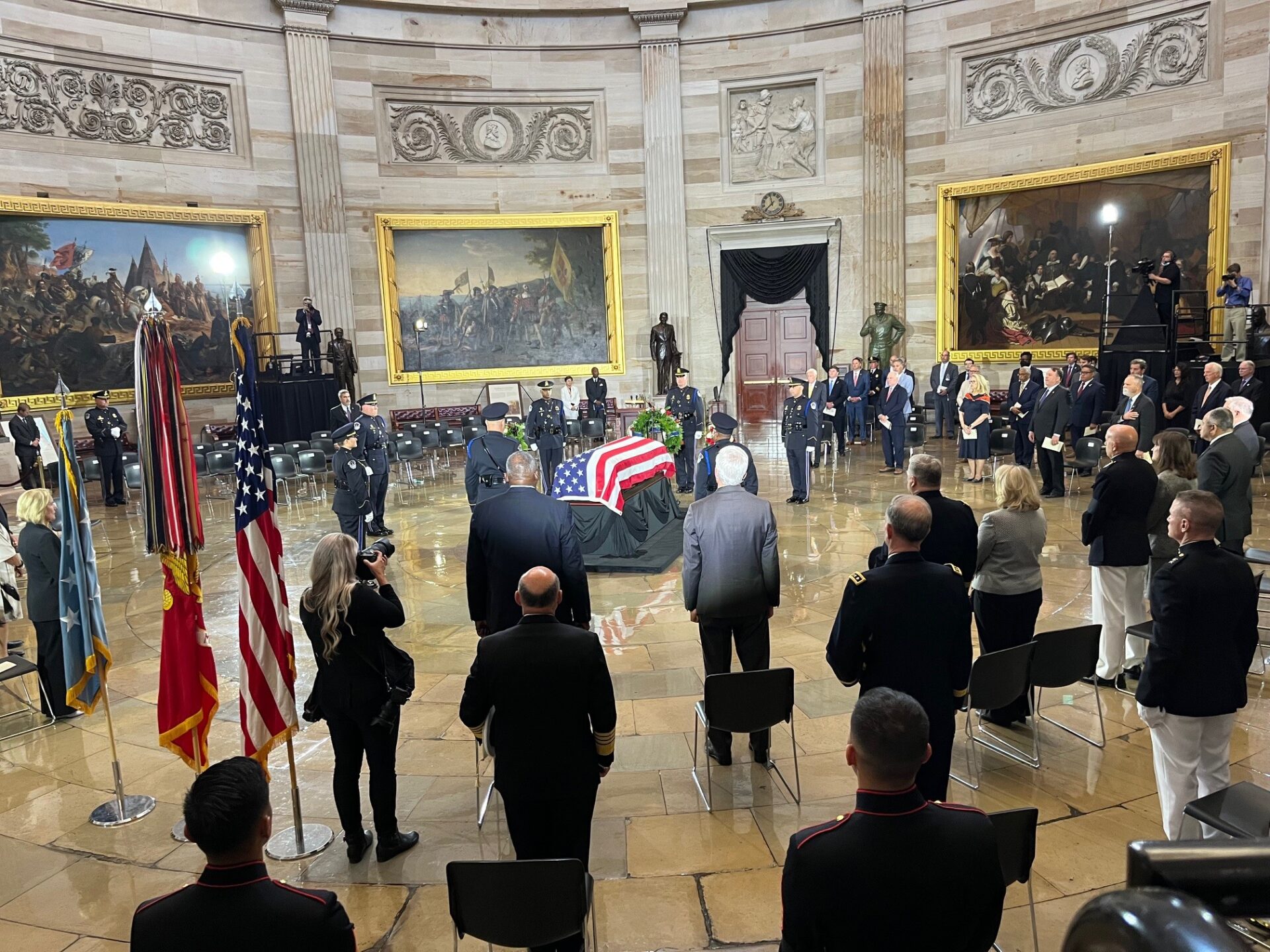The state Senate unanimously approved a resolution in February to place a statue of Hershel “Woody” Williams in the U.S. Capitol. Williams, who died in 2022 at age 98, was the last surviving Medal of Honor recipient from World War II.
The measure, though, did not get a vote in the House of Delegates before the regular session ended. Curtis Tate spoke with Chad Graham, Williams’ grandson, about what happens next.
This interview has been edited for clarity and length.
Tate: How come the legislature didn’t complete its work on the resolution to place the statue?
Graham: My understanding is, and of course, I’m a resident, as my granddad used to call it ‘that foreign state over there,’ Kentucky. So I’m about two hours and 40 minutes from where I grew up there, and the Huntington-Barboursville area, but my understanding is, it was just timing. It seems like there’s widespread support of this. And I think it was just how things fell in terms of what they were trying to get through within that session. And everybody feels confident that in this next round, or I guess, maybe in a special session, it’s something that will get pushed to the top of the stack, so to speak, but that’s my understanding.
Tate: What would your grandfather think about the effort to put his statue inside the Capitol?
Graham: I’ve never known anyone that was more proud and loved more being a West Virginian. My grandmother was the same way. She used to joke, ‘I’ve got five grandsons.’ My mother, Tracy, still lives in Barboursville. But the other daughter lives in Ohio. Her sons live in Ohio, and then three of us grandsons live in Kentucky. And one day my grandmother’s over visiting the family in Ohio, and she was still living and she said, “Do you think it’s time for us to get back home? The air is just better over there.” And it was I mean, they were you know, they were in like Marietta so that was right across the river. But point being, he loved being a West Virginia and he loved West Virginia so much. Even where he chose to be laid to rest there with my grandmother at Donnel C. Kinnard State Veterans Cemetery, so many people said Woody, you know, as a Medal of Honor recipient, Arlington does welcome those recipients to be buried there and their spouses. He said, “That’s not where I’m from.” He said, “I want to be with my people. I want to be in West Virginia.” So I know this for him would be so, so meaningful.
Tate: Once the legislature is fully on board, how long might this take?
Graham: My understanding is that it is a multi-year process, as many things in the District are, especially when it involves the Capitol, the way that the Capitol is governed and the design components of this and how that design would be developed. Even down to the medium used for the statute itself, there are fairly clear-cut regulations and guidelines for that. I can send you some quick reads in terms of how the statuary works. But it would be a multi-year process. And if that all went smooth – I know just enough to be dangerous in terms of how the different committees work when it comes to design and things like that at the district or within the district, especially within the Capitol. It could be as quick as two to three years. There are components of it that would be out of the hands of our state of West Virginia, essentially.
Tate: The rotunda was full of dignitaries the day his casket was brought in. Do you see that happening when the statue is unveiled?
Graham: Of course, we miss him every day. Still, every single day. But it warmed our hearts, made us feel very thankful for everybody that supported him. And I feel like this would be much the same. He was so generous with his time and who he was that he gave a little piece of himself to everyone that he met and interacted with, and even some folks that he never met. I think what he meant to people is part of why this is important. And I am certain that on that wonderful day when this is unveiled that there’ll be a lot of people squeezing in to be a part of that, to see it and and support it and support what he’s about.
Tate: The last survivor of the USS Arizona attack at Pearl Harbor just died. Your grandfather was part of a generation we’re losing fast.
Graham: On the (USS) Missouri, it’s probably been 2016-17, somewhere in that space. With then five of the living Arizona survivors of course as you mentioned, we just lost the last one but sitting with those five gentlemen and then going into the captain’s quarters on the Missouri, decorated as it was in World War II with pictures of the commander in chief (Harry) Truman in the cabin. And these old guys, it was like dialing back the clock, they might as well been 21 years old again. You know, giving each other a hard time of course, Papaw being a Marine like your granddad and these guys being Navy and giving each other just all kind of grief, and then when they christened my granddad’s ship in San Diego. Those guys came to support him, those Arizona survivors, and to lose them I think that to me, it breaks your heart a little bit to see – not a little bit – it breaks your heart, period, to see that generation dwindling away because they’re from a different fabric.
